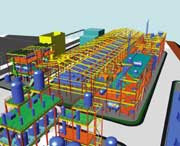WASTE GAS DECHLORINATION UNIT
The waste gas dechlorination unit is a safety system to avoid chlorine emissions at any operating conditions of the plant. It operates under suction and absorbs chlorine gas or chlorine bearing waste air from any source of the process. The chlorine neutralization takes place by absorption in 18% NaOH lye in three stages arranged in series. The absorption product is sodium hypochlorite solution, which is further chlorinated to produce a marketable product.
SODIUM HYPOCHLORITE FORMATION
The absorption of chlorine gas in caustic soda takes place by following reaction;
Cl2 (g) + 2NaOH (l) ------- > NaOCl + NaCl + H2O + 350 kcal/kg Cl2
Above 38ºC, decomposition of NaOCl to NaClO3 (chlorate) will be favoured, so low temperatures are to be maintained during dechlorination. The solubility of the hypochlorite solution in general is dependant on five factors;
1. Hypochlorite concentration.
2. Concentration of certain catalyst.
3. Alkalinity or pH value of the solution.
4. Temperature of the solution.
5. Exposure to ultraviolet light.
The effect of variations in each of these factors together and separately, has been studied quantitatively. The most stable solutions are those of low hypochlorite concentration, with a pH of 11 or higher, low copper and nickel contents, and stored in the dark at low temperatures.
Copper, nickel and cobalt are powerful catalysts of decomposition. Of these, copper is the one generally present to some extent and should be kept as low as possible, not over 0.0001% (1 ppm) in the finished (15%) bleach. In this connection, it is important to observe every precaution to avoid copper contamination from pipe lines and valves which may be used in handling the chlorine. Such lines and valves must be kept internally free from moisture to prevent active corrosion by the chlorine.
A large excess alkalinity does not stabilise 15% NaOCl solutions any more than a slight excess (0.5% NaOH), but if the alkalinity drops below 0.05% NaOH, or a pH of about 11, decomposition becomes more rapid.
Stability of hypochlorite solutions is expressed by the term “half-life”. This is number of days required for the NaOCl or available chlorine content of a bleach solution to be reduced to half its initial value.

